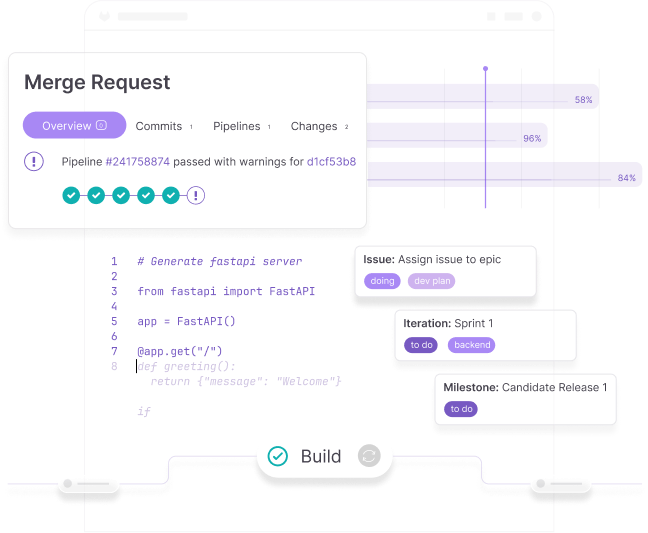Automated software delivery
Build, test, package, and deploy secure software in a fraction of the time. Again and again.

Deliver better products faster
GitLab automates the building, testing, packaging, and deploying of secure code from code commit to production. This means better code, faster releases, fewer bugs, and more time spent on new, innovative features.
Minimize manual repetitive tasks and context-switching, so developers can focus on work that delivers value to the business.
Your fast-track to product innovation
Source code management
Software development that's iterative, tested, and always releasing
Learn moreCollaborate and accelerate, all in one place
With asset version control, tight feedback loops, and powerful branching patterns, it's simple for your developers to solve problems and ship value, fast.
Institute reliable, scalable governance for your source code
Guarantee quality and standards for all your projects by mandating a set number of necessary merge approvals with built-in code review. With these guardrails in place, you'll feel confident about code quality as your organization scales.
Continuous integration & continuous delivery
Make secure software delivery repeatable and scalable
Learn moreIntegrate security into your CI pipelines
GitLab's industry leading CI capabilities enable automated testing, Static Analysis Security Testing, Dynamic Analysis Security Testing, and code quality analysis to provide fast feedback to developers and testers about the quality of their code.
Leverage simple, scalable CI/CD
You can run your CI/CD jobs on GitLab.com and GitLab Dedicated using GitLab-hosted runners to seamlessly build, test and deploy your application in your own environment.
Dynamic AI-driven development
Accelerate your time to market without sacrificing security
Learn moreIncrease developer speed and efficiency
With GitLab Duo, developers can automate repetitive tasks, get code explanations and suggestions, improve code quality, and get answers to questions right in the IDE.
Harness AI beyond code creation
Developers can also use GitLab Duo to understand and remediate security vulnerabilities, triage pipeline failures, and more to ensure their security efforts are matching the pace of their productivity.

By switching to GitLab and automating deployment, teams have moved from monthly or weekly deliveries to daily or multiple daily deliveries.
Explore all automated software delivery features
Release better quality code, more often, with minimal manual intervention.
Streamline your software delivery lifecycle and boost efficiency with GitLab.
By incorporating automated software deployment into your production environments, you can accelerate software development and deliver innovative products to your customers faster.
Contact sales to get started





